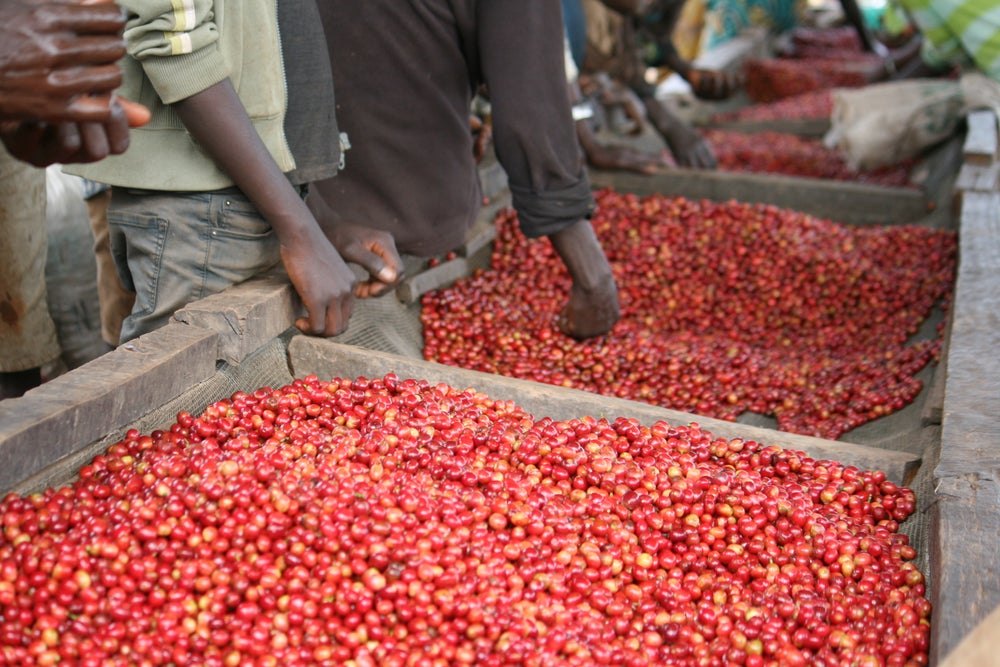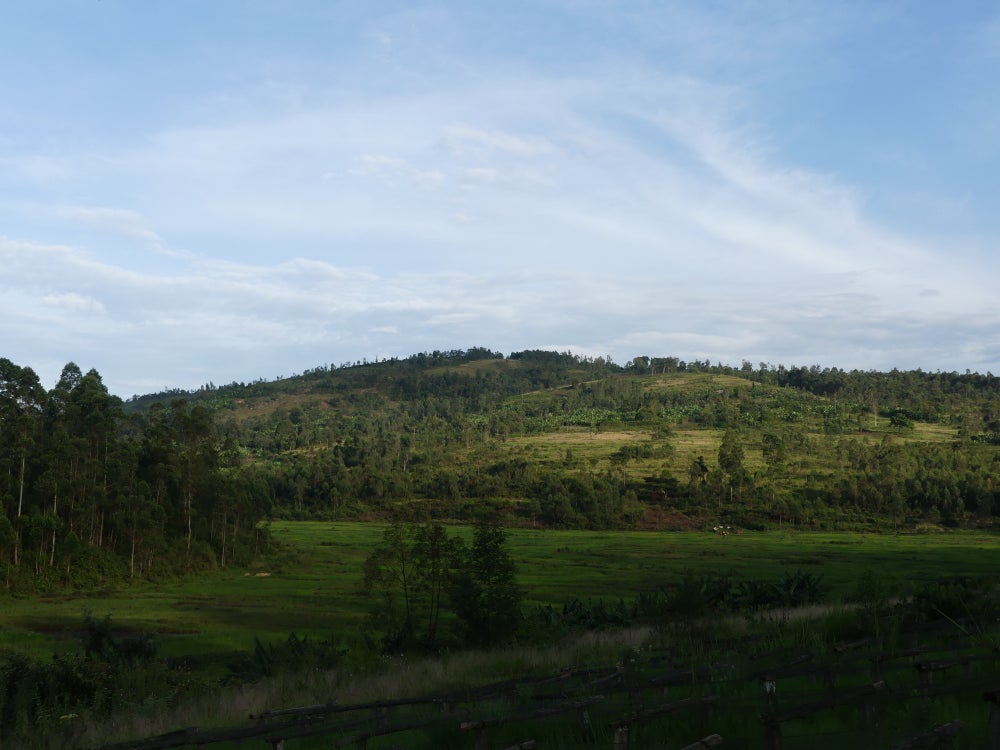About This Coffee
Gihere CWS was founded in 1984. The station is surrounded by important coffee history. Just six kilometers from the station, a famous Prince named Bigayimpunzi played a role in the democratization of coffee farming. People called coffee “the precious cherry” and it became the main crop of this region. Its popularity was due in large part to the way it helps boost the livelihoods of thousands of locals.
The region became a crossroads for coffee and the coffee trade boomed. Coffee’s importance in the lives of locals in the region is evident in their everyday parlance. Farmers who needed a loan would tell their lender, “I’ll pay you when I harvest my coffee, not when I harvest my cassava,” indicating the important role coffee played in bringing money into homes in the region.
The name Tangara, the subregion where Gihere CWS is located, comes from the word “Gutangara” meaning “to be surprised.” This came from the story that local people were astonished by helicopters flying over their lands and dropping small pieces of paper from the sky. The area was a military training zone and the ‘small pieces of paper” were actually troops engaging in skydiving exercises. The machinery was so unfamiliar to the local villagers that, from their distant vantage point, they mistook them for pieces of paper.
More than 1,323 farmers from 22 nearby hills contribute their cherry to Gihere CWS. The washing station is overseen by the sustainability and CWS manager, Roméon Patience. The station has 3 soaking tanks, 12 fermentation tanks, 230 drying tables, 4 selection tables and 6 floating tanks all of which allow the station to process up to 1,200 metric tonnes of cherry per season. The season typically runs from April to June.
The construction of Gihere CWS has enabled local coffee farming families to sell coffee as cherry at fair prices, avoiding the high labor and time costs of processing in order to spend more time pursuing other projects and income generating activities.
Gihere CWS also participates in a number of farmer outreach and support projects include a goat and pig project, Farmer Hub, strengthening cooperatives and distributing fertilizer and coffee trees.
Cultivation
Most coffee trees in Burundi are Red Bourbon for reasons of quality. Because of the increasingly small size of coffee plantings, aging rootstock is a very big issue in Burundi. Many farmers have trees that are over 50 years old, but with small plots to farm, it is difficult to justify taking trees entirely out of production for the 3-4 years it will take new plantings to begin to yield. In order to encourage farmers to rennovate their plantings, Bugestal purchases seeds from the Institut des Sciences Agronomiques du Burundi (ISABU), establishes nurseries and sells the seedlings to farmers at or below cost. In 2018, Gihere CWS produced 33,800 seedlings, bringing their total production from 2014-2018 to 113,249 seedlings.
Despite the ubiquity of coffee growing in Burundi, each smallholder producers a relatively small harvest. The average smallholder has approximately 250 trees, normally in their backyards. Each tree yields an average of 1.5 kilos of cherry so the average producer sells about 200-300 kilos of cherry annually.
Harvest & Post-Harvest
Today, Gihere CWS saves families valuable time while offering good prices for their cherry. The average cherry buying price for Bugestal in 2019 was significantly above average. CWSs make the first payment to farmers between 15-30 June. The second payment comes later in the summer. If the coffee wins a competition or sells for extremely high specialty prices, Bugestal gives another payment approximately a year after the harvest season.
During the harvest season, all coffee is selectively hand-picked. Most families only have 200 to 250 trees, and harvesting is done almost entirely by the family. Bugestal knows that even small distances can be time consuming and expensive to travel for smallholder farmers, and they know that receiving cherry immediately after harvest is crucial to quality. Therefore, smallholders can bring their cherries either directly to a central washing station (CWS) or to one of the 10-15 collection sites situated throughout growing areas. Farmers are paid the same for their quality cherry regardless of where they bring their cherries. In this way, farmers are not disadvantaged due to their location, and Bugestal bears the cost of transport to CWS’s.
Natural processed coffees are less common in Burundi and require strict attention to detail to ensure quality. Quality assurance begins as soon as farmers deliver their cherry. All cherry is floated in small buckets as a first step to check its quality. Bugestal still purchases floaters (damaged, underripe, etc) but immediately separates the two qualities and only markets floaters as B-quality cherry. After floating, the higher quality cherry is sorted again by hand to remove all damaged, underripe and overripe cherries.
After sorting, the beans are then transported directly to the drying tables where they will dry slowly for 3-4 weeks. Cherry is initially laid out in a single layer. Pickers go over the drying beans for damaged or defective beans that may have been missed in previous quality checks. The CWS is very strict about allowing only the highest quality cherry to complete the drying process. The beans are covered with tarps during periods of rain, the hottest part of the day and at night. On the table, the beans are dried to 11.5%.
Quality Control at Bugestal
Once dry, parchment is bagged and taken to the warehouse. Bugestal’s team of expert cuppers assess every lot (which is separated by station, day and quality) at the lab. This traceability of the station, day and quality is maintained throughout the entire process.
Before shipment, coffee is sent to Budeca, Burundi’s largest dry mill. The coffee is milled and then hand-sorted by a team of hand-pickers who look closely at every single bean to ensure zero defects. It takes a team of two hand-pickers a full day to look over a single bag. UV lighting is also used on the beans and any beans that glow — usually an indication of a defect — are removed.
The mill produces an average of 300 containers of 320 bags per year. Budeca is located in Burundi’s capital city, Gitega, where the population is around 30,000 people. Since there are approximately 3,000 people working at the mill - mostly as hand pickers - this means that Budeca employs nearly 10% of the total population in Gitega for at least half the year (during the milling season). The same is true in the provinces of Ngozi and Kayanza, where Bugestal is among the first employers in the region during the coffee harvest season. This has an incalculable impact on a country like Burundi - where unemployment rates are above 50% - especially in rural areas and among young people.
About Bugestal
Bugestal’s headquarters are located in Ngozi Province in the Northern part of Burundi, approximately 150km from Bujumbura, the largest city and previously the capital of Burundi. Bugestal operates nine washing stations in Ngozi and Muyinga provinces and works with more than 15,000 farmers. Coffee washing stations are all certified by Rainforest Alliance, 4C and C.A.F.E. Practices. Bugestal is part of the Sucafina Group, a family-owned coffee company promoting farm-to-roaster trade. Bugestal creates social impact at origin using farm-direct supply chains and works in collaboration with the Kahawatu Foundation to help farmers improve their livelihoods through the increase of coffee production.
Coffee in Burundi
Burundi has long been overlooked in comparison to its neighboring East African specialty coffee producing powerhouses. However, Burundi season, for us, is one of the highlights of the annual coffee calendar. The country’s coffee is produced almost entirely by smallholder farmers, and much of this small-scale production is of exceptional quality. With its super sweet, clean and often floral coffees, Burundi, every year, is increasingly is putting itself on the specialty coffee map.
Coffee is of paramount importance to families and the country at large. Considering this, improving and expanding coffee infrastructure is not just a way to improve incomes, it is a way to revolutionize the earning potential of an entire nation.
Building washing stations and expanding agricultural extension work can be great ways to improve coffee quality. Washing stations are pivotal in improving cup profile standards and the global reputation of Burundian coffee.
Both state-owned and private actors drive Burundi’s coffee industry and play key roles as washing station management companies and exporters. State-owned companies are called Sogestals, short for “Sociétés de Gestions des Stations de Lavage” (Washing station management companies). Privately-owned companies can operate under a variety of different names.
Sucafina’s history in Burundi goes back to 2007 when Bucafe/Sucafina Burundi was established in Bujumbura. Through Bucafe, we work with several privately-owned washing station management companies and exporters. Our work bridges the entire supply chain, allowing us to be vertically integrated. Our supply chain is solid, reliable and transparent. Due to this, we are more efficient, able to supply better value and positioned to offer both producers and consumers of Burundian coffee a diversity of expertise.

